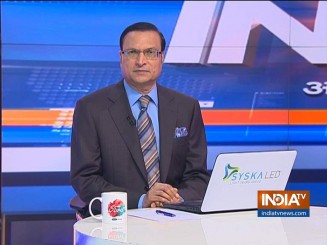 The biggest single day spike of 5,376 fresh COVID-19 cases was reported across India on Wednesday with Delhi touching a new high of 534 cases on a single day. The big single-day spikes are being noticed for the last five consecutive days and the situation could turn for the worse with the return of lakhs of migrant workers to their villages. Maharashtra’s total tally of COVID-19 cases is nearing the 40,000 mark.
The biggest single day spike of 5,376 fresh COVID-19 cases was reported across India on Wednesday with Delhi touching a new high of 534 cases on a single day. The big single-day spikes are being noticed for the last five consecutive days and the situation could turn for the worse with the return of lakhs of migrant workers to their villages. Maharashtra’s total tally of COVID-19 cases is nearing the 40,000 mark.
There are two good news for travellers: air travel will resume from May 25 with several restrictions, and booking for railway tickets for 200 special non-AC trains will begin today (Thursday).
These measures do not mean that the pandemic situation has improved. On the contrary, the number of fresh cases is rising daily and everybody needs to be on guard and practice social distancing norms.
On Wednesday, in my prime time show ‘Aaj Ki Baat’, we showed how graves are being prepared in advance in Mumbai, Ahmedabad, Surat, Bhopal and Indore for COVID-19 victims. Normally graves are dug four to six feet deep, but according to standard COVID-19 protocol, 10 feet deep grave is a must. Only two family members are allowed to be present for prayers. In some cities, JCB machines are being used to dig up graves.
These visuals brought scary memories of the digging of mass graves in New York and Brazil, and we should pray that such a situation does not happen in India. The death toll across India is presently on the lower side in proportion to the number of COVID-19 cases, which means that nearly half of the patients have recovered.
Mumbai seems to be the most troubled hotspot, with 22,500 cases and a death toll of more than 800. Nearly one in every four Indians dying of Coronavirus is a Mumbaikar. The pressure on caretakers of cemeteries is tremendous and they are preparing graves in advance.
The second most troubled hotspot is Ahmedabad, with nearly 9,000 cases and a death toll above 576. Jamalpur, Behrampura, Danilimda, Khadiya, Gomtipur, Saraspur, Dariapur and Shahpur are Muslim-dominated localities, from where the maximum number of cases have come. Graves are being prepared in the cemeteries to face the oncoming challenge.
Other cities like Surat, Bhopal and Indore are also facing the brunt of COVID-19 cases and caretakers of cemeteries in these cities are also gearing up in advance.
The situation is acute also at cremation grounds. The bodies are disposed of in electric crematoriums, but the problem arises over collection of ashes. Since only two family members are allowed, they leave soon after the cremation, and due to lockdown, many family members are unable to return and collect ashes for imersion in rivers. Lockers have been set up at several crematoriums to store these ashes.
My intention of showing visuals of graves was not meant to shock viewers, but to convey to them about the impending danger of the spread of this pandemic. Each one of us needs to be alert and vigilant, maintain social distancing in offices and markets, and keep family members protected from the scourge of this virus.
On the migrants front, there was good news on Wednesday, when Railways ran 204 special trains to ferry them to their native places. Sixty five special trains ran from Maharashtra, 22 special trains ran from Delhi on Wednesday and 92 special trains carrying migrants reached different cities of UP.
206 more special trains will run in the next 48 hours. So far, more than 16 lakh migrants have returned to UP in nearly 1,000 trains. The UP government has deployed 12,000 roadways buses to ferry six lakh migrants to their towns and villages.
I am waiting for the day when people will not find a single migrant walking on foot on highways. The constant refrain of these migrant workers, who had lost their source of earnings, has been: “we want to go home”. They were unwilling to listen to promises and pleas.
These workers, like most of us, have simply no idea when this pandemic will end. Nobody can promise with certainty that the pandemic will end by a certain date. With such an uncertain future, these workers decided to return home and wait till situation returns to normal.
From today, Railways will run 400 special trains for migrants, and already thousands of buses are being run by state governments to ferry them. The new challenge will now arise in rural areas, where these migrants will reach. Many of them could be carriers of the virus, and given the poor medical infrastructure in rural areas, it could be a tough time for community health planners in coping up with the challenge.
Click Here to Watch Full Video | Get connected on Twitter, Instagram & Facebook